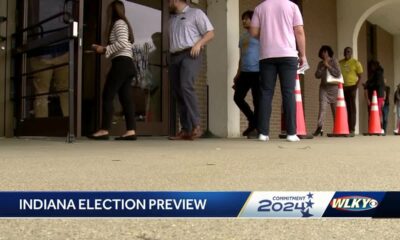Mississippi News
Doctors fear abortion laws will tie their hands as patients suffer
‘Huge gray zone’: Mississippi doctors fear new abortion laws will tie their hands as pregnant patients suffer
Dr. Nina Ragunanthan wonders exactly how long she’s supposed to watch a miscarrying woman bleed before Mississippi law permits her to perform an abortion.
The OB/GYN in the Delta worries that the state’s new laws — banning abortion “except in the case where necessary for the preservation of the mother’s life or where the pregnancy was caused by rape” — could force doctors to wait for patients to deteriorate before providing life-saving care. She wonders: Who decides when the patient’s life is in danger, and how imminent does the danger have to be?
“Does it have to be that she’s going to die in 30 minutes if we don’t do this?” Ragunanthan said. “That she’s at risk of dying within 24 hours? How much are we going to let her bleed? Do we have to wait until she needs a blood transfusion, start transfusing the blood, then do an abortion? … Am I going to be at legal risk for saving someone’s life if a court decides the risk to life wasn’t imminent enough to justify (an abortion)?”
These questions — and many others — haven’t been answered by state officials, law enforcement officers, hospital leadership or judges. And some OB/GYNs worry the lack of clarity will have a chilling effect on physicians who will either delay or refuse to perform abortions for fear of legal repercussions. If a doctor’s decision is challenged and they wind up on trial for performing an allegedly illegal abortion, they face up to 10 years in prison.
Two of the health care workers interviewed by Mississippi Today spoke on the condition of anonymity because they fear backlash or even legal scrutiny for discussing a highly sensitive topic.
Marc Rolph, a spokesman for the University of Mississippi Medical Center, said the hospital won’t comment on any questions related to the state’s new abortion laws and how its doctors will implement them. UMMC is home to the state’s largest group of maternal-fetal medicine subspecialists, and OB/GYNs around the state, like Ragunanthan, frequently refer patients with high-risk pregnancies there. Some UMMC doctors reached by Mississippi Today said they had been instructed not to speak to media about anything related to abortion.
None of the medical professionals interviewed by Mississippi Today said they had received any guidance from their employers as to how to interpret the new laws.
“Have I read a sheet of paper that tells me what to do in the middle of the night when I’m on call?” one Jackson-area OB/GYN said. “No, there’s not that. You’re probably going to need approval if you’re facing a difficult decision, particularly with the exceptions in the law.”
Mississippi Department of Health spokeswoman Liz Sharlot said the agency could not answer any questions dealing with the impact of the state’s abortion laws in the wake of the Dobbs ruling. She referred questions to the Attorney General’s office, though on Tuesday all pending litigation ended when the state’s last abortion clinic dropped its lawsuit that sought to prevent the ban from taking effect.
Questions sent to the office of Attorney General Lynn Fitch, who argued on the state’s behalf that the U.S. Supreme Court overturn Roe, were not answered.
The Mississippi State Board of Medical Licensure executive director Dr. Kenneth Cleveland said the board does not currently have plans to issue any statements about abortion issues in Mississippi. The board has the authority to investigate physicians and revoke their licenses for performing illegal abortions.
Anti-abortion advocates, lawmakers and some doctors say that the exception gives physicians the discretion to determine when an abortion is necessary. They point out that most of the roughly 2,500 abortions performed annually in Mississippi prior to the U.S. Supreme Court’s ruling in Dobbs v. Jackson Women’s Health Organization were elective. They say that doctors already regularly make weighty choices in high-pressure situations.
“I don’t see that these decisions have changed with this law,” said Dr. Geri Weiland, president of the Mississippi State Medical Association and a Vicksburg pediatrician. “I really don’t. I think the decisions have always been difficult.”
Dr. Terry McMillin, an OB/GYN in Greenwood, describes himself as pro-life. He doesn’t foresee the new abortion restrictions changing his practice at all. This week, he removed an ectopic pregnancy just as he always has, with no extra calls to attorneys or administrators.
He generally refers patients with high-risk pregnancies to UMMC early on. In other complex situations, like labor beginning before viability, he counsels patients about what to expect and monitors them carefully for signs of danger. Those situations, and others where an abortion could be necessary to save the pregnant person’s life, are rare, he said.
“A lot of times I’m gonna put it in the hands of the creator, because I believe there is a God, and I believe in the providence of God, that everything happens for a reason and that he’s in control of it all, so I think we should give life a chance, if we can,” he said.
Richard Roberson, vice president of state policy at the Mississippi Hospital Association, said the organization had been fielding questions from members about compliance with the new laws, but that decisions will largely be made by medical staff on a case-by-case basis. Clarification from lawmakers or through the courts would be helpful, he said.
“It’s hard to issue specific guidance on a very non-specific law,” he said, referring to what hospital administrators might be able to provide their staff at this point.
Even so, he doesn’t expect doctors or patients to be at risk of legal or medical consequences: Physicians have always sought to protect maternal and fetal health in complicated situations, and he doesn’t see that changing.
But some doctors aren’t reassured.
The Jackson-area OB/GYN said that life-threatening conditions during pregnancy often occur on a spectrum and can develop over time; they’re not always an obvious catastrophe like an ectopic pregnancy that could rupture and cause internal bleeding. For example, a patient with serious pre-existing heart problems will likely be stable early in a pregnancy but have a high risk of developing life-threatening symptoms as the pregnancy progresses.
Before, the doctor routinely presented the option of early termination. Now, the OB/GYN said, “that discussion has been taken out of our hands as clinicians.”
“There’s a huge gray zone which leaves people at risk and providers possibly confused,” she said.
Doctors also expect that even though the law permits abortions in cases of rape, no one in the state will be willing to do the procedure under those circumstances, fearing potential prison time or costly lawsuits.
“I don’t think people in Mississippi can have comfort around, ‘Oh, if I’m raped, I will have access,’” the Jackson-area OB/GYN said. “You probably won’t. You’ll have to find someone to do it that includes a hospital with the whole team there supporting that, and that’s much more difficult.”
The people who wrote the laws that now dictate decisions in every hospital around the state don’t seem to understand pregnancy, doctors told Mississippi Today.
“The situation is far too complex for a statute,” said one women’s health care provider. “It needs to be between the doctor and the patient.”
The Jackson Women’s Health Organization was for years the only facility in the state that provided elective abortions. Before the Supreme Court overturned Roe v. Wade in June, Mississippi doctors generally sent patients there or to clinics in other states for non-emergency procedures.
In emergencies, however, doctors at hospitals around the state have terminated pregnancies to protect their patients. Though the law still technically permits that, the language “in the case where necessary for the preservation of the mother’s life” isn’t a clear medical standard.
Mississippi OB/GYNs interviewed by Mississippi Today listed a range of scenarios in which a patient’s life is clearly at risk, but maybe not enough risk to pass muster under the law.
Up to about 30% of all pregnancies end in miscarriage, and some people experience heavy bleeding. One potential treatment is a dilation & curettage (D&C) to remove the tissue from the uterus. Ragunanthan said that if the fetus still has cardiac activity, the procedure is an abortion, though there’s no chance of a live birth. Facing legal uncertainty, Ragunanthan worries doctors may stand by as the patient bleeds and potentially requires a blood transfusion.
In other states, miscarrying people have already reported being denied care and sent home to wait.
“I work in a rural hospital where – it’s not like a major trauma center, we don’t have a huge blood bank, and so things like that scare me,” Ragunanthan said.
She described another scenario: If a woman’s water breaks before viability, which occurs around 24 weeks of pregnancy, the fetus has a very low chance of survival because its lungs cannot develop without amniotic fluid. The woman then has a high risk of infection, but the fetus may still have cardiac activity.
As part of the ongoing legal battle over Louisiana’s trigger ban, a New Orleans doctor filed an affidavit describing how after a patient’s water broke at 16 weeks, the doctor planned to perform a dilation and evacuation (D&E) to end the nonviable pregnancy. Then her hospital’s lawyers told her that wasn’t legal.
Louisiana’s ban – which had briefly gone into effect before a judge issued a temporary restraining order while the court challenge plays out – includes an exemption for “medically futile” pregnancies that could apply in such cases (though the state health department has not issued a list explaining what situations that includes). Mississippi’s law has no such exemption.
“What are you supposed to do?” Ragunanthan said. “Are you supposed to wait until she becomes infected? … Do you have to wait until it gets into the bloodstream?”
For people with pulmonary hypertension, becoming pregnant carries a roughly 30 to 56% risk of death. The women’s health care provider who spoke to Mississippi Today said she wasn’t sure what the law would permit in such a case.
“It feels like to me, the laws are written for – ‘Well, there’s that chance that everything will be OK,’” she said. “A lot of times it’s just not.”
The Jackson-area OB/GYN said she thinks the onus to explain how to apply the new laws at the bedside falls on lawmakers, regulators and law enforcement.
“I need their help on what they will choose to prosecute and what they won’t,” she said
So far, none of them have offered any guidance, though two Mississippi DAs have said they won’t prosecute people for abortions.
Sen. Joey Fillingane, R-Sumrall, principal author of the trigger ban, said he thinks doctors will do what they need to do to save a patient’s life. If a doctor’s decision is called into question and criminally investigated, he said he expects they would have documentation to show they had acted in accordance with the law.
“I mean, I didn’t go to med school, so I’m not going to sit here and armchair quarterback what a bunch of OB/GYNs will be deciding, whether this specific case is sufficient to qualify,” he said. “That’s why we meet every session. We can certainly revisit that law and add more flesh to the bone.”
Weiland, the head of the state medical association, said she doesn’t expect to see doctors being investigated and prosecuted for making good-faith decisions.
“Mississippians are very fair people,” she said. “I don’t see the state supporting doctors being prosecuted for doing what we’ve been doing, taking care of moms and complications of pregnancies forever. That’s what we do … Maybe I’m being too optimistic about it. But I personally don’t see that being something that’s supported by this law.”
Mississippi Today community health editor Kate Royals contributed to this story.
This article first appeared on Mississippi Today and is republished here under a Creative Commons license.
Mississippi News
Ole Miss women get pair of double-doubles and roll to 83-65 March Madness win over Ball State
SUMMARY: Mississippi coach Yolett McPhee-McCuin found solace in returning to a different arena in Waco, Texas, following a disappointing previous tournament experience. The No. 5 seed Ole Miss Rebels redeemed themselves with an 83-65 victory over 12th-seeded Ball State in the NCAA Tournament’s first round. Starr Jacobs led the Rebels with 18 points and 11 rebounds, while Kennedy Todd-Williams and Madison Scott each scored 15 points. Ole Miss dominated rebounding, leading 52-32, and will face fourth-seeded Baylor next. Coach McPhee-McCuin noted the team’s evolution since their last visit and the significance of playing in Texas, where Jacobs feels at home.
The post Ole Miss women get pair of double-doubles and roll to 83-65 March Madness win over Ball State appeared first on www.wjtv.com
Mississippi News
Events happening this weekend in Mississippi: March 21-23
SUMMARY: This weekend (March 21-23), Mississippi offers a range of exciting events. Highlights include Hal’s Marching MALfunction Second Line Stomp and Jessie Robinson’s blues performance in Jackson, as well as the Natchez Food & Wine Festival and the Natchez Little Theatre’s production of *This Side of Crazy*. There are also numerous exhibitions like *Of Salt and Spirit: Black Quilters in the American South* in Jackson and *Gold in the Hills* in Vicksburg. Other events include the 48th Annual Crawfish Classic Tennis Tournament in Hattiesburg, karaoke nights in Laurel, and a variety of family-friendly activities across the state.
The post Events happening this weekend in Mississippi: March 21-23 appeared first on www.wjtv.com
Mississippi News
Events happening this weekend in Mississippi: March 14-16
SUMMARY: This weekend (March 14-16) in Mississippi offers a variety of events. In Jackson, iconic saxophonist Boney James performs at the convention center, while the JXN Food & Wine festival showcases culinary talents. The LeFleur Museum District hosts a “Week of Wonder,” and several exhibitions, including “Of Salt and Spirit,” celebrate Black quilters. Natchez features the Spring Pilgrimage tours, a reenactment of Annie Stewart’s story, and a St. Patrick’s Day celebration. In Hattiesburg, comedian Rob Schneider performs, and various events like a St. Patrick’s Day pub crawl and a talent show will take place throughout the area.
The post Events happening this weekend in Mississippi: March 14-16 appeared first on www.wjtv.com
-

 News from the South - Florida News Feed7 days ago
News from the South - Florida News Feed7 days agoFamily mourns death of 10-year-old Xavier Williams
-

 News from the South - Alabama News Feed5 days ago
News from the South - Alabama News Feed5 days agoSevere storms will impact Alabama this weekend. Damaging winds, hail, and a tornado threat are al…
-

 News from the South - Alabama News Feed5 days ago
News from the South - Alabama News Feed5 days agoUniversity of Alabama student detained by ICE moved to Louisiana
-

 News from the South - Louisiana News Feed6 days ago
News from the South - Louisiana News Feed6 days agoSeafood testers find Shreveport restaurants deceiving customers with foreign shrimp
-

 News from the South - Oklahoma News Feed3 days ago
News from the South - Oklahoma News Feed3 days agoTornado watch, severe thunderstorm warnings issued for Oklahoma
-

 News from the South - Oklahoma News Feed7 days ago
News from the South - Oklahoma News Feed7 days agoWhy are Oklahomans smelling smoke Wednesday morning?
-

 News from the South - West Virginia News Feed6 days ago
News from the South - West Virginia News Feed6 days agoRoane County Schools installing security film on windows to protect students
-

 News from the South - West Virginia News Feed7 days ago
News from the South - West Virginia News Feed7 days agoStudents in Monroe County Schools are ready to shoot their way to the WV State Archery Championships















































